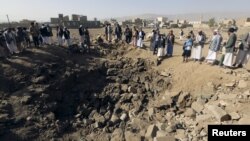Saudi-led air strikes targeting a military camp killed at least eight civilians in the central Yemeni city of Taiz on Sunday, a medical source said, while France's top diplomat offered Western support to Riyadh's air campaign.
Saudi Arabia and its Sunni Arab allies began airstrikes against the Houthis more than two weeks ago, hoping to halt their advance toward the southern port city of Aden, where clashes continued Sunday.
While meeting with Saudi King Salman in Saudi Arabia, French Foreign Minister Laurent Fabius said Sunday France was "naturally on the side of its regional partners for the restoration of stability in Yemen," according to his entourage.
"Concerning Yemen, we are here to demonstrate our support, especially political, to the Saudi authorities," Fabius told reporters as he began a series of meetings with Salman.
The air raids were aimed at a site held by soldiers loyal to former Yemeni President Ali Abdullah Saleh who have joined up with Iranian-allied Houthi rebels against local militias in the south, the source said.
Former president
Saleh remains highly influential despite having given up power in 2012 after mass protests against his rule and troops loyal to him back the Houthis.
The campaign has raised fears that a sectarian proxy war between rivals Riyadh and Tehran will further destabilize the Middle East and potentially destroy the Yemeni state.
In a sign of the military's weakening control, suspected al-Qaida militants killed an army colonel in the central Shabwa province on Sunday, a local official said.
Separately, an al-Qaida leader was killed in an apparent U.S. drone strike on a group of militants west of the port city of Mukalla on the Arabian Sea, residents told Reuters.
It was the first reported drone strike against the powerful Yemeni branch of the global militant group since the U.S. evacuated about 100 special forces troops advising Yemeni forces last month.
While the United States and its Sunni Gulf allies are worried about the threat from Sunni radicals such as al-Qaida, they also fear the war will increase the influence of Shi'ite Iran.
Saudi Arabia is concerned its war on the Houthis could spill over the border, but Iran has denied Saudi allegations that it has provided military support to the group.
The Houthis also deny getting help from Iran and say their armed campaign is designed to stamp out corruption and Sunni al-Qaida militants.
Saudi Arabia dismissed Iranian calls for an end to its airstrikes Sunday, saying Tehran should not interfere in the conflict.
“How can Iran call for us to stop the fighting in Yemen? … We came to Yemen to help the legitimate authority, and Iran is not in charge of Yemen,” Saudi Foreign Minister Saud al-Faisal said in the Saudi capital Riyadh at a press conference with French counterpart Laurent Fabius.
Civilian deaths
The United Nations says the conflict, in which the Houthis seized the capital Sana'a in northern Yemen in September, has killed 600 people, wounded 2,200 and displaced 100,000 others.
Saudi Arabia said Saturday that at least 500 insurgent Shi'ites have been killed along the Saudi-Yemen border since the Saudi-led coalition launched airstrikes late last month. It did not say how it arrived at that figure.
A Saudi Defense Ministry statement also said three Saudi border guards were killed in a mortar attack Friday in the Saudi border province of Najran.
The statement did not provide details of how the death toll was tabulated. But a coalition spokesman earlier in the day said there had been 1,200 coalition airstrikes between March 26 and midday Saturday, including sorties on the southern port city of Aden that killed at least 22 people.
The airstrikes so far have failed to stop the Houthi rebel advance across the country.
Some material for this report came from Reuters, AFP and AP.





